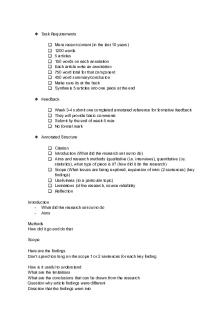CRIM 2140 Notes WEEK 3 PDF

| Title | CRIM 2140 Notes WEEK 3 |
|---|---|
| Course | Interviewing and Professional Skills |
| Institution | Douglas College |
| Pages | 3 |
| File Size | 59.8 KB |
| File Type | |
| Total Downloads | 34 |
| Total Views | 147 |
Summary
Lecture Notes...
Description
CRIM 2140 LECTURE NOTES WEEK 3 September 19th, 2019 Perceptions of Yourself and Others How do self-perceptions and opinions of other impact your decisions? Perceptions of Self (con.t) Your “self-concept” plays a role in how/why you communicate with others And how you interpret the meaning of how other communicate to you What does “Self-Concept” mean? “. . . Refers to all the beliefs that a person may have with respect to their own behavior. It includes your physical, mental, vocational, and communication capabilities….” Self-Concept Formed Through Self-appraisal: do you look in the mirror and make a judgement about yourself? Reactions and Responses Reactions and responses of others: o How do you react to what people say about you? o What does it depend on? Roles Presented through roles we play in our lives – these roles are many identities that you have Influential Values in the Formation of Your Self Concept Cultural, ethnic or racial background and values learned Family and gender roles Influences (con.t) Spiritual beliefs and the influence of religion in your life Your education and what you have learned over the course of your life Your peers and friends Your job, your training, who trains you Personal value system or personal code of ethics Role of Self Concept in How Your Communicate Predictor of behaviour – when your behaviour becomes a “self-fulfilling prophecy”. Two Types of Self Fulfilling Prophecies
1. Self-imposed prophecies- when your actions may be governed by the expectations that others have of you 2. Other imposed prophecies- when your actions may be governed by the expectations that others have of you Role of Self- Concept Filter of statements Influence of word selection and tone of voice Role of Self Concept (con.t) Moderator of competing internal messages in your brain- may help to choose a course of actions Influence on perceptions of others How do you form opinions of others? Imagine you walk into a room full of people that you do not know. You look around the room at the people forming opinions of people. What influences these opinions? Are opinions accurate? Are your impressions based on accurate information? Will your perceptions change? Why? Factors affecting accuracy of perceptions of others Emotional state- how you are feeling at the moment of the interaction Assumed similarity- assumed people are like you if you share some similar characteristics Selective perception- think highly of someone you want to be with admire, then get to know them and realize you were wrong perceptual defence- looking at the world through “rose colored glasses” halo effect- form a complex opinion of someone based on a dominant characteristic ethnocentrism- process of judging another culture using the standards of one’s own culture of the superiority of your own culture stereotyping- judging a category or class of people Stereotyping Distinguish between a class or category Observe 1 or more people in this category exhibiting certain traits Generalize from this and perceive everyone in this category exhibits these traits Make judgements about entire group Negative Stereotyping Identify negative characteristics
Generalize to whole group Verify through own experience Justification for unfair treatment Separate, exclude with feelings of fear and hostility
Improving Perceptions of Self and Others Question accuracy, seek more info Separate facts from inferences Don’t jump to conclusions Realize perception can change over time Practical Cultural Respect Article: “Counselors should understand cultural differences” “cultural competence”- know and understand the various ways culture impacts the counselling relationship and the need to increase sensitivity of unique backgrounds of clients” ex. Language difficulties, eye contact, etc....
Similar Free PDFs

CRIM 2140 Notes WEEK 3
- 3 Pages

Week 10 crim - notes
- 3 Pages

Crim Notes
- 10 Pages

Crim pro week 4 lec - notes
- 23 Pages

Week 12 Crim Police Discretion
- 2 Pages

Crim Tutorial 3
- 6 Pages

Week 3 - Lecture notes week 3
- 11 Pages

Crim Law notes
- 38 Pages

LSS Crim 2 notes
- 20 Pages

Lecture notes, Crim Legislation
- 7 Pages

Crim B Notes
- 75 Pages

Crim notes 4 27
- 5 Pages

Crim J complete notes
- 35 Pages
Popular Institutions
- Tinajero National High School - Annex
- Politeknik Caltex Riau
- Yokohama City University
- SGT University
- University of Al-Qadisiyah
- Divine Word College of Vigan
- Techniek College Rotterdam
- Universidade de Santiago
- Universiti Teknologi MARA Cawangan Johor Kampus Pasir Gudang
- Poltekkes Kemenkes Yogyakarta
- Baguio City National High School
- Colegio san marcos
- preparatoria uno
- Centro de Bachillerato Tecnológico Industrial y de Servicios No. 107
- Dalian Maritime University
- Quang Trung Secondary School
- Colegio Tecnológico en Informática
- Corporación Regional de Educación Superior
- Grupo CEDVA
- Dar Al Uloom University
- Centro de Estudios Preuniversitarios de la Universidad Nacional de Ingeniería
- 上智大学
- Aakash International School, Nuna Majara
- San Felipe Neri Catholic School
- Kang Chiao International School - New Taipei City
- Misamis Occidental National High School
- Institución Educativa Escuela Normal Juan Ladrilleros
- Kolehiyo ng Pantukan
- Batanes State College
- Instituto Continental
- Sekolah Menengah Kejuruan Kesehatan Kaltara (Tarakan)
- Colegio de La Inmaculada Concepcion - Cebu


